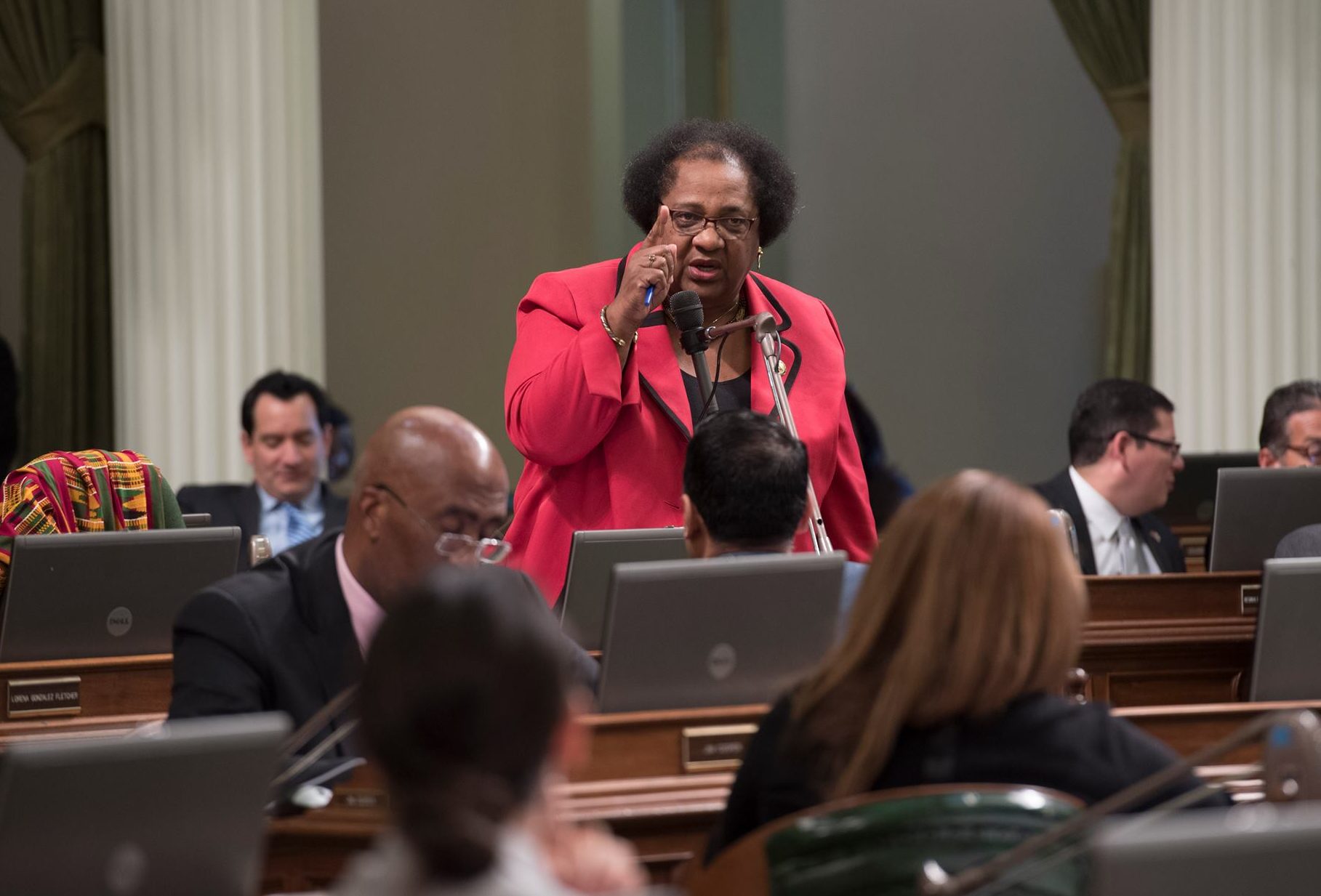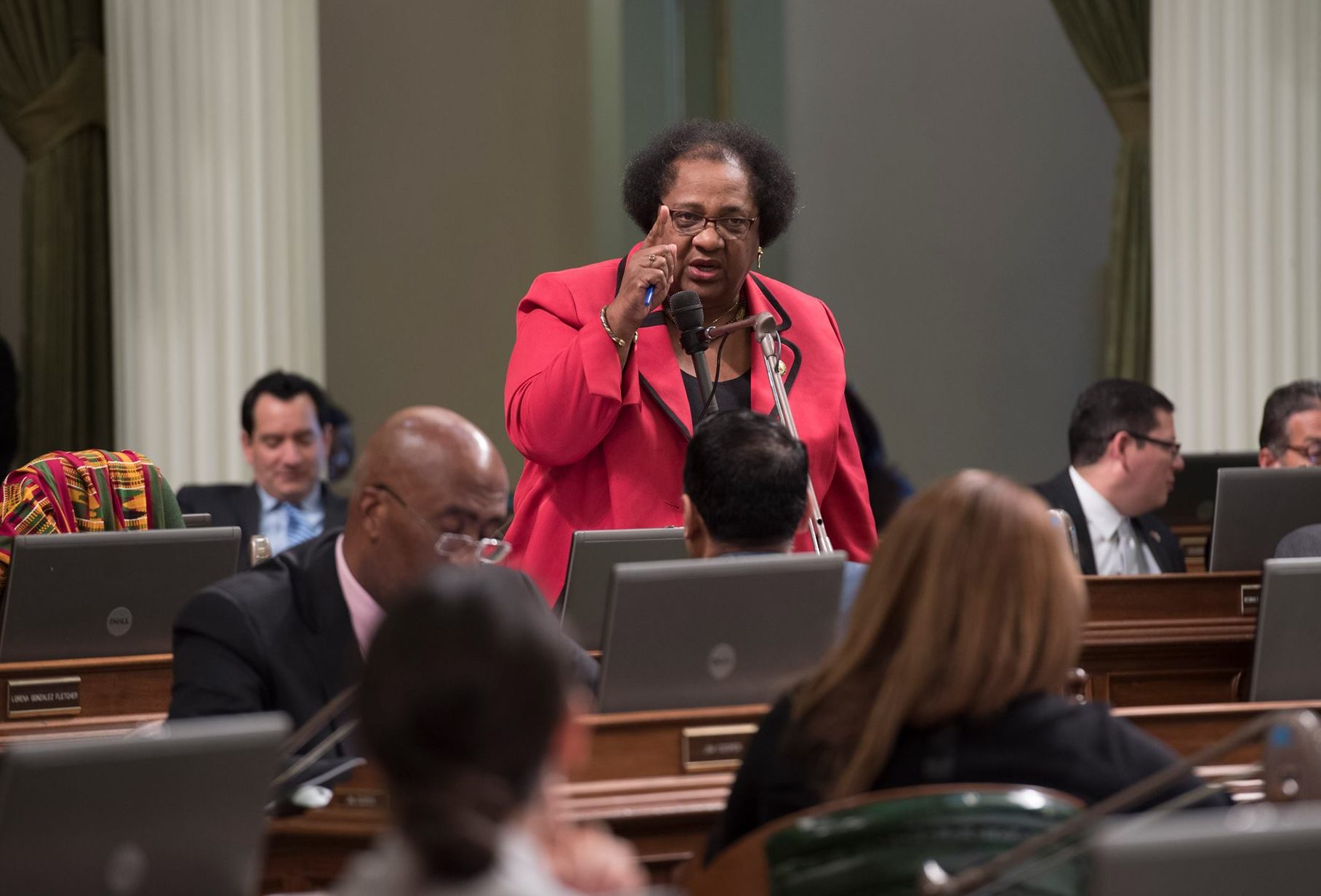California Adopts New Laws to Fight Racism in Jury Selection
California just made it harder for prosecutors to exclude Black people from jury trials, amid broader reforms against racial discrimination in courtrooms.
Kyle C. Barry | September 30, 2020


This article originally appeared on The Appeal, which hosted The Political Report project.
California will make it harder for prosecutors to exclude Black people from jury trials, amid broader reforms against racial discrimination in courtrooms.
During the 2017 murder trial of Gary Timothy Bryant Jr. and Diallo Ray Jackson, who are both Black, prosecutors in Contra Costa, California, struck all six Black people from the jury pool. They excluded four of them with peremptory strikes—the rule that allows lawyers to exclude a certain number of jurors for nearly any reason or no reason at all—later citing the prospective jurors’ prior experiences with or stated distrust of law enforcement.
One of the potential jurors, for example, said that he had been pulled over three times, once because his truck was two inches too high. Another said that he felt some police officers “abuse their authority, especially involving Black suspects.”
The defense lawyers objected, accusing prosecutors of trying to pick a jury that excluded “the human experience of what a Black person goes through in this society.” It’s unconstitutional for prosecutors (and defense lawyers) to strike jurors because of their race, a rule the Supreme Court established in its landmark 1986 decision Batson v. Kentucky.
But even under Batson, courts still allow prosecutors to exclude jurors for reasons that track closely with race and racial stereotypes, like living in a predominantly Black neighborhood or wearing dreadlocks, providing wide leeway that has led to the continued exclusion of Black people from jury service. Many cases have also held that prosecutors can strike jurors specifically because they or their family members had been victims of racial discrimination in the criminal legal system, viewed police and prosecutors with skepticism, or advocated for racial justice. Being Black isn’t a valid reason to dispense with a juror. But living the reality of being Black in America, or trying to do something about it, is, in many cases, fair game.
That was true for the Black people who appeared for jury duty at Bryant and Jackson’s 2017 trial. Citing these prior court decisions, the trial court upheld the prosecution’s strikes and seated a jury without a single Black member. Both men were convicted, and the convictions were later affirmed on appeal.
Still, for one of the judges who heard their appeal, California First District Appellate Court Judge Jim Humes, the case screamed for reform. “In light of the undeniable evidence that some minority groups—particularly black men—have been overpoliced and subjected to harsher sentences than others,” he wrote in a concurrence, “it hardly seems race neutral to categorically allow potential jurors to be stricken simply because they have had contact with or hold negative opinions about law enforcement or the judicial system. Reflexively allowing these strikes compounds institutional discrimination.”
“The time has come,” Judge Humes said, “for the Legislature, Supreme Court and Judicial Council to consider meaningful measures to reduce actual and perceived bias in jury selection.”
California responded this week with a new law that overhauls how peremptory challenges may be used in California jury trials. It shrinks prosecutors’ ability to exclude Black people and others based on their affiliation with protected groups.
Assembly Bill 3070, introduced by Assemblymember Shirley Weber and signed into law today by Governor Gavin Newsom, is a significant if incomplete blow against racial discrimination in jury selection. It establishes a presumption that certain reasons for excluding jurors are improper proxys for racial discrimination, and targets implicit or unconscious bias in jury selection—something that the Batson ruling did not prohibit and may have actually invited. The law takes effect for criminal cases in January 2022, and will apply to civil cases in 2026.
It’s the first legislative reform of its kind in the country, though it follows a similar rule that the Washington State Supreme Court adopted in 2018. Other state supreme courts, including California’s, are studying potential reforms as well.
The law is part of a broader attempt this month to fight both intentional and implicit bias and close racial disparities in California’s criminal legal system.
Another jury reform, Senate Bill 592, will expand California’s pool of prospective jurors by including everyone who files an income tax return. This will make the jury pool better reflect the state’s population because jurors are now primarily drawn from people who are registered to vote or have a driver’s license. This practice disproportionately excludes Black and Latinx residents, as well as people with lower income.
Newsom also signed the California Racial Justice Act (AB 2542), a sweeping reform that will allow people to challenge convictions and sentences that are based on race.
While AB 3070 tightens the rules on the front end of prosecutions, during jury selection, the Racial Justice Act provides a remedy for discrimination on the back end, allowing for post-conviction hearings to present evidence that racial or ethnic animus infected any stage of the prosecution, including “in the exercise of peremptory challenges.” Crucially, this new law permits statistical evidence to show racial disparities in charging and sentencing decisions over time, and allows courts to grant relief where they exist.
—
Over the last four decades, study after study after study has found that racism remains endemic in jury selection. One recent report from the Berkeley Law School death penalty clinic, “Whitewashing the Jury Box,” analyzed nearly 700 appeals from 2006 though 2018 involving objections to prosecutors’ strikes, and found that California prosecutors used peremptory challenges to remove Black jurors in 72 percent of the cases and white people in only 0.5 percent. Yet California’s appellate courts rarely intervene, further emboldening prosecutors. During the last 30 years, the California Supreme Court reviewed 142 cases with jury discrimination claims and found violations in only three, according to the report.
These findings are unsurprising given how easy Batson has made it to disguise discrimination. Under the rules Batson established, which California’s new law will replace but which will remain in place in most other states, prosecutors need only provide some “race-neutral” reason for striking jurors even when they are challenged. Under Supreme Court precedent, the reasons can be “implausible,” “silly,” “fantastic” or “superstitious,” like “the juror had a beard” or “long curly hair.”
Marshalling evidence to prove that such reasons are merely a cover for discrimination can be nearly impossible, and in any case judges are often reluctant to accuse prosecutors—usually people with whom they have an ongoing professional relationship—of being lying racists.
Batson also does nothing to curb implicit bias. Even well-intentioned prosecutors bring socially constructed, internalized stereotypes to jury selection, and may rely on those stereotypes without realizing it. Concurring in Batson, Justice Thurgood Marshall gave the example of a prosecutor whose “own conscious or unconscious racism may lead him easily to the conclusion that a prospective black juror is ‘sullen,’ or ‘distant,’ a characterization that would not have come to his mind if a white juror had acted identically.” Indeed, throughout California, training manuals encourage prosecutors to “follow gut instincts” on jury selection, without explaining how “gut instinct” is often little more than decision by crude racial stereotype.
Under Batson, California prosecutors have successfully excluded Black people “because they had dreadlocks, were slouching, wore a short skirt and ‘blinged out’ sandals, visited family members who were incarcerated … or lived in East Oakland, Los Angeles County’s Compton, or San Francisco’s Tenderloin,” according to the Berkeley Law School report.
To confront these problems, California’s new reform eliminates Batson’s onerous demand that a defense team prove purposeful discrimination on the part of prosecutors in order to challenge a peremptory strike. Instead, it lowers the standard to prohibit implicit or unconscious bias as well, making strikes unlawful if “an objectively reasonable person” would believe that “race, ethnicity, gender, gender identity, sexual orientation, national origin, or religious affiliation” was a factor in their use, whether intentionally or unintentionally. The law specifically instructs courts to consider the effect of implicit bias on peremptory strikes when making such determinations.
The law also presumptively bars an enumerated list of reasons for excluding jurors, particularly ones tied to negative racial stereotypes or factors that are more commonly affiliated with marginalized groups. Those include “having a negative experience with law enforcement” and “expressing a belief that law enforcement officers engage in racial profiling or that criminal laws have been enforced in a discriminatory manner.”
No longer can prosecutors strike jurors because of their neighborhood, or their appearance, or the fact that they receive state benefits, or because the prosecutor perceives that a potential juror is inattentive or has a “problematic attitude”—at least not without convincing the judge, with evidence, that the strike is related to the juror’s ability to be fair and impartial and not the product of discrimination. By listing these specific explanations that have long provided cover for discrimination, the law takes the various policies and practices that prosecutors have developed over decades to skirt Batson and makes them illegal.
But the very need for such a carefully tailored reform is itself a sign that it will be insufficient.
When Justice Marshall concurred in the Batson decision, he rightly predicted that the “decision today will not end the racial discrimination that peremptories inject into the jury-selection process.” Discrimination—particularly racial discrimination—and peremptory strikes are inexorably intertwined. As Marshall wrote, the goal of ending discrimination “can be accomplished only by eliminating peremptory challenges entirely.”
In the years since, a growing number of judges, academics, and lawyers have embraced that view, calling for the abolition of peremptory strikes. This would mean that jurors can only be excluded for cause—that is, through an affirmative showing that a potential juror cannot follow the law or be fair and impartial. Such a reform is hardly radical, and California is free to enact it, though it chose not to this year. After all, as Supreme Court Justice Stephen Breyer wrote in 2005, “the right to a jury free of discriminatory taint is constitutionally protected—the right to use peremptory challenges is not.”


